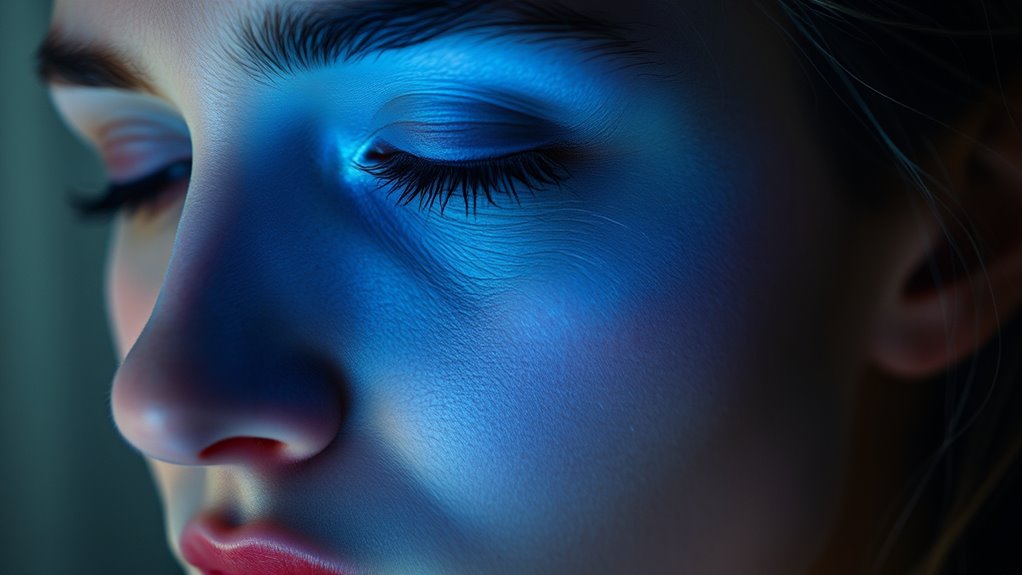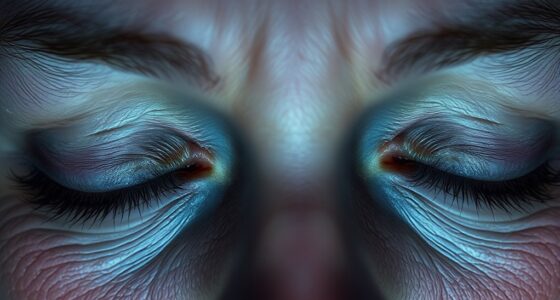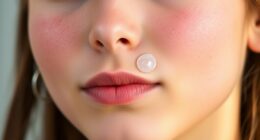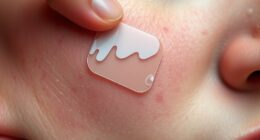Blue light penetrates deep into your delicate periorbital skin, speeding up aging signs like fine lines and wrinkles. It damages collagen and elastin, making this thin skin more vulnerable to sagging and dullness. Continuous exposure can also lead to dark circles and pigmentation. Protecting this area with filters, antioxidants, and proper skincare can help, but staying aware of blue light’s effects is key to maintaining youthful, healthy skin around your eyes.
Key Takeaways
- Blue light penetrates deep into the skin, accelerating aging and damaging collagen, especially around the delicate periorbital area.
- Thinner skin around the eyes makes the periorbital region more vulnerable to blue light-induced pigmentation and loss of firmness.
- Prolonged blue light exposure can weaken the skin’s barrier, increasing susceptibility to environmental stressors and premature aging signs.
- Blue light may contribute to dark circles and fine lines, emphasizing the importance of protective skincare and habits.
- Using blue light filters, protective eyewear, and antioxidant skincare can mitigate damage and support periorbital skin health.
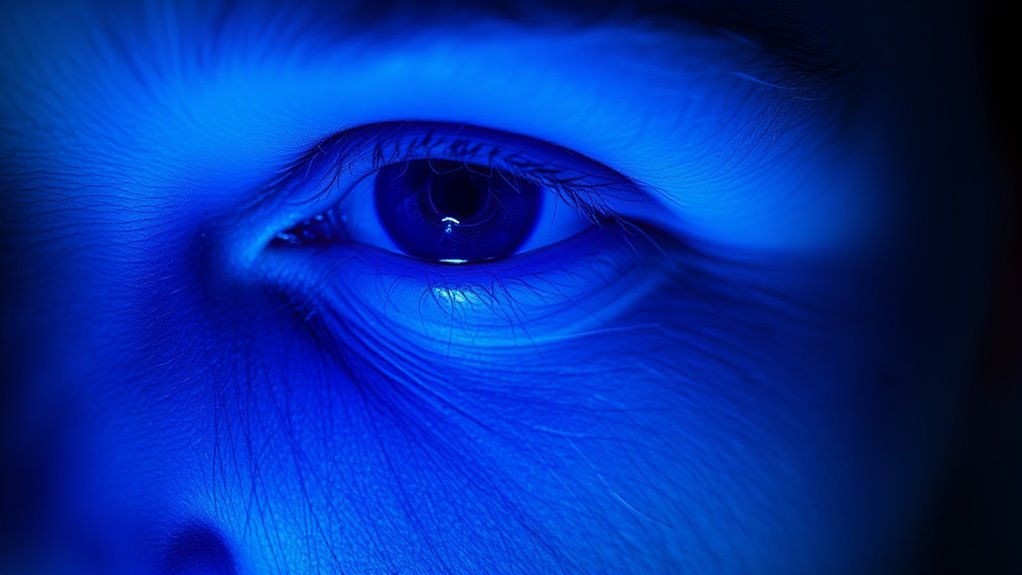
As our exposure to digital screens increases, blue light from devices like smartphones and computers has become a growing concern for skin health, especially around the delicate periorbital area. This region, which surrounds your eyes, is particularly vulnerable because the skin here is thinner and more prone to damage. Blue light, also known as high-energy visible light, penetrates deeper into the skin than other wavelengths, potentially accelerating skin aging. Over time, this exposure can lead to fine lines, wrinkles, and loss of skin elasticity, making you look older than you feel. The cumulative effect of blue light exposure can compromise your skin’s collagen and elastin, essential proteins that keep your skin firm and youthful. Beyond skin aging, there’s also concern about how blue light might impact your eye health. The intense exposure, especially during prolonged screen time, can cause digital eye strain, dryness, and discomfort. Some studies suggest that blue light may contribute to retinal damage over time, raising fears about longer-term eye health risks. While research is ongoing, it’s clear that the periorbital area and your eyes need some protection from this pervasive light source.
You might not realize it, but your daily habits play an especially important role in how much blue light reaches your skin and eyes. Spending hours in front of screens without breaks increases blue light exposure, making your skin more susceptible to premature aging and your eyes more vulnerable to strain. Continuous exposure can weaken the skin’s barrier, making it less capable of defending itself against environmental stressors, including blue light. This can lead to increased pigmentation, dark circles, and a dull appearance around your eyes. Protecting this area is essential, so consider incorporating blue light filters into your devices, or wearing glasses with blue light blocking lenses. Also, applying skincare products with antioxidants like vitamin C and E can help neutralize free radicals generated by blue light exposure, reducing skin aging signs. Hydration remains indispensable, as well-hydrated skin is more resilient against environmental damage.
Keep in mind that limiting screen time, especially before bed, can markedly reduce blue light exposure, giving your skin and eyes a much-needed break. Regularly using eye creams formulated for the delicate periorbital skin can further strengthen this area, helping to diminish the visible signs of aging and protect your eye health. Ultimately, being mindful of your digital habits and taking proactive steps can preserve the youthful appearance of your skin and maintain healthy eyesight in an increasingly digital world.
Frequently Asked Questions
Can Blue Light Exposure Cause Permanent Skin Damage?
Blue light exposure doesn’t typically cause permanent skin damage, but it can lead to blue light pigmentation and inflammation over time. You might notice skin becoming dull, red, or discolored if exposed frequently without protection. To minimize risks, use broad-spectrum sunscreens or blue light-blocking skincare products. While permanent damage is unlikely, consistent exposure can cause lasting effects, so it’s best to limit your blue light exposure and protect your skin.
Are Certain Skin Types More Vulnerable to Blue Light?
Certain skin types are more vulnerable to blue light because of their skin pigmentation and sensitivity. If you have darker skin, you might be more prone to pigmentation changes from blue light exposure. Likewise, sensitive skin can react more intensely, leading to irritation or early aging signs. You should consider these factors when managing your exposure, using protective measures like skincare products with antioxidants or physical barriers to minimize effects.
How Does Blue Light Affect Skin Aging Around the Eyes?
Blue light acts like a thief, quietly stealing your skin’s youthful glow around your eyes. It accelerates aging signs, causing fine lines and wrinkles to emerge faster. Think of retinol effects as your skin’s shield, boosting cell turnover, while antioxidant benefits combat free radicals, preserving your skin’s vibrancy. Protecting this delicate area now helps maintain firmness and radiance, preventing premature aging from blue light’s sneaky assault.
What Are the Best Protective Measures Against Blue Light?
To protect your skin from blue light, you should use blue light filters on your devices and incorporate protective skincare into your routine. Apply broad-spectrum sunscreens daily, even indoors, to block blue light rays. Wearing sunglasses with UV and blue light protection outdoors also helps. Additionally, consider using skincare products with antioxidants like vitamin C, which can combat free radical damage caused by blue light exposure.
Does Blue Light Impact Skin Hydration Levels?
Yes, blue light can affect your skin’s hydration levels. It may weaken your hydration barrier, leading to decreased moisture retention and dryness. You might notice your skin feeling tight, dull, or flaky. To combat this, focus on strengthening your hydration barrier with nourishing ingredients, maintaining consistent moisture retention, and protecting your skin with barrier-repairing products. Keep your skin hydrated, resilient, and healthy despite blue light exposure.
Conclusion
You might be surprised to learn that studies show nearly 80% of people are exposed to blue light daily, mainly through screens. This exposure can affect your delicate periorbital skin, potentially accelerating aging and causing damage over time. While more research is needed, it’s clear that protecting this area is important. So, consider limiting screen time or using protective measures—your skin will thank you for it!
